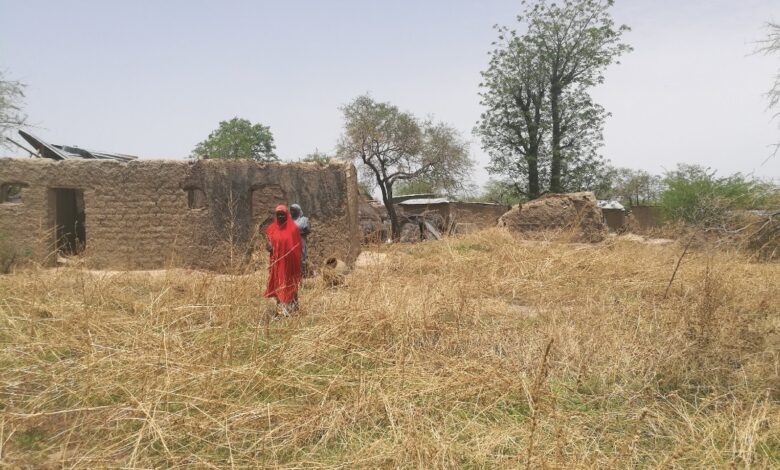ISWAP Still Controls Vast Areas of Guzamala In Northeast
Guzamala area of northern Borno has remained an ungoverned territory of Nigeria, where Islamic State West African Province (ISWAP) wields control.

There are 14 towns and villages that make up the Guzamala Local Government Area of Borno State in Northeast Nigeria. Of this number, only two are accessible and partially inhabited, while the rest, including Gudumbali, the local government’s headquarters, remains under the control of ISWAP.
In April 2021, HumAngle published a report on how insurgents have controlled Guzamala in northern Borno, despite claims by the Nigerian government and the military.
According to multiple sources, an attempt was made about three months ago to return civilian authority to some parts of the area ahead of the expected return of internally displaced persons (IDPs) taking refuge in nearby Local Government Areas. But that effort was met with stiff resistance and losses.
A top government official who wanted to be anonymous disclosed that three months ago, the government deployed officials of the ministry of reconstruction, rehabilitation and resettlement (RRR) with two excavators and several trucks to dig parapets around Mailari village to enable IDPs from Guzamala in Monguno and Nganzai to return there.
That attempt was disrupted when insurgents came in large numbers, dislodging the crew and setting ablaze the two excavators and about four trucks. As a result, the source added, “That was how the project was stopped as everyone, including the security protecting them, fled the area.”
The incident was not reported in the media as officials who were familiar with it kept quiet about it.
HumAngle understands that Guzamala’s location is strategic to the insurgents because it links directly with their enclave. It is also a significant pathway for the movement of the terror group; as such, occupying it would affect their operation.
“That’s why ISWAP insurgents would do everything to fortify their presence around Guzamala to ensure it remained ungoverned and under their full control,” the source stated.
Before its population was displaced, Guzamala, which covers about 2,517 square kilometres, was occupied by mostly farmers who grow crops like groundnut, onions, rice and millet.
In 2015, the military recaptured the area after losing over 200 soldiers in the battle of Gudumbali. During a commemoration event for the soldiers killed in the fight, the then army chief, Lieutenant General Tukur Buratai, said, “From 2013, 2014 and 2015, it was difficult to enter Gudumbali from the eastern axis.”
The former army chief also spoke on the difficulty faced as the routes were mined and fortified, which led to several unsuccessful attempts in the past. However, regaining control of the strategic town was short-lived as the terror group returned and dislodged the stationed military base.
In June 2018, authorities had reported that more than 2,000 IDPs of Guzamala extraction living in Bakassi Camp in Maiduguri, the Borno state capital, had commenced movement to return to their original homeland.
Months later, ISWAP targeted the area’s main town and the military base. An Army base in Metele village was also attacked as part of the group’s large-scale campaign that led to the abandoning of several bases and the establishment of the super camp strategy.
“To date, I can say without fear of contradiction that not a single military deployment has been made to salvage Guzamala, my local government area,” Abdulkarim Lawan, the speaker of the Borno state House of Assembly, recently said.
Lawan disclosed that the state governor, Babagana Zulum, had recently directed another excavator to be deployed to Mailari and Lingir villages to complete the trench digging project stopped at Mailari due to attacks.
A credible government source has also revealed that local government officials have obtained permission from the state government to temporarily move the headquarters from the inaccessible Gudumbali to Mailari village.
The source stated, “What else can we do other than move the seat of the council area to a safe location since the main villages like Adua, Gudumbali, Guworam, Guzamala, Kangarwa, Moduri and Wamiri are all a no-go-area?”
“For now, only Mailari and Lingir villages are safe for habitation, and that’s why efforts are being made to see that the place is properly secured for our people to be moved there,” they added.
Support Our Journalism
There are millions of ordinary people affected by conflict in Africa whose stories are missing in the mainstream media. HumAngle is determined to tell those challenging and under-reported stories, hoping that the people impacted by these conflicts will find the safety and security they deserve.
To ensure that we continue to provide public service coverage, we have a small favour to ask you. We want you to be part of our journalistic endeavour by contributing a token to us.
Your donation will further promote a robust, free, and independent media.
Donate HereStay Closer To The Stories That Matter




